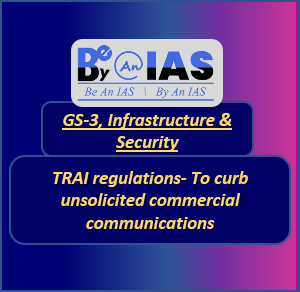CURRENT AFFAIRS
Get the most updated and recent current affair content on Padhaikaro.com
TRAI regulations- To curb unsolicited commercial communications
- Be N By IAS, Delhi
- 03, Feb 2021

For: GS-3: Infrastructure: Telecom Sector
GS-3: Security: Cyber Security
CONTEXT:
The Delhi High Court ordered the Telecom Regulatory Authority of India (TRAI) to ensure “complete and strict” implementation of the regulation issued by it in 2018 for curbing unsolicited commercial communications (UCC).

NEWS IN DETAILS:
- Court also directed the telecom service providers (TSPs) to ensure strict compliance with the Telecom Commercial Communications Customer Preferences Regulations (TCCCPR) 2018 issued by TRAI
- Bharat Sanchar Nigam Ltd (BSNL),
- Reliance Jio,
- Airtel and
- Vodafone,
- Plea by Paytm: The court’s direction came while disposing of a plea by One97 Communications Ltd, which runs Paytm.
- Defrauded by phishing: It claimed that millions of its customers have been defrauded by the phishing activities over the mobile networks and the failure of the telecom companies to prevent the same has “caused financial and reputational loss”.
- HC Order: “We expect TRAI to strictly implement the regulations and in case of any violation, action would be initiated in accordance with the regulations.”
Violation of obligations under TCCCPR 2018:
- Paytm had, in its plea, alleged that telecom operators are not blocking those who are defrauding its customers by “phishing” activities over various mobile networks.
- Paytm had contended that the telecom majors are violating their obligations under the TCCCPR 2018, to curb problem of unsolicited commercial communications
- Obligation: Under the regulations, the telecom companies are required to verify purported telemarketers seeking registration (called registered telemarketers or RTMs) with them before
- Granting access to their customer data and
- Also take action immediately against all fraudulent rtms.
- It contended that the Telco’s “failure” to undertake proper verification prior to such registration enables fraudulent telemarketers to carry out phishing activities.
UNSOLICITED COMMERCIAL COMMUNICATIONS (UCC):
UCC stands for “Unsolicited Commercial Communication”.
- It means any Commercial Communication which a subscriber opts not to receive.
- It does not include:
- Any transactional message or
- Any message transmitted on the directions of
- Central Government or
- State Government or
- agencies authorized by it.
- “Commercial Communication”: It means any message, voice or SMS, made through telecommunications service, which is transmitted for the purpose of informing or soliciting or promotion of any commercial transaction in relation to goods, investment or services.
- “Telemarketer: It means a person or legal entity engaged in the activity of transmission of commercial communications.

Telecom Commercial Communications Customer Preferences Regulations (TCCCPR) 2018
- It seeks to curb the problem of
- Unsolicited Commercial Communication (UCC) or
- spam calls and
- spam messages.
- Registration of Telemarketer: Companies will have to register themselves for commercial SMS and calls. This will help the regulator to regulate the fraud companies. The salient features of the regulation:
- Adoption of Distributed Ledger Technology (or blockchain) as the RegTech to ensure regulatory compliance while allowing innovation in the market.
- Co-regulation: Telecom Service Providers/ Access Providers establish and arrange the framework, which is legally backed by regulation.
- Enabling compliance: Through innovation in technology solutions that are demonstrated in a regulatory sandbox.
- Enhanced controls and new options for all entities to perform their functions and to carry on their businesses efficiently

Source: The Hindu
MCQs:
Q. Unsolicited Commercial Communication means any Commercial Communication which a subscriber opts not to receive. It does not include:
- Any transactional message
- Any message transmitted on the directions of Central Government
- Any message transmitted on the directions of State Government
Which of the above statements is/are correct?
- a) 1 and 2 only
- b) 2 and 3 only
- c) 1 and 3 only
- d) 1, 2 and 3
ANS: D